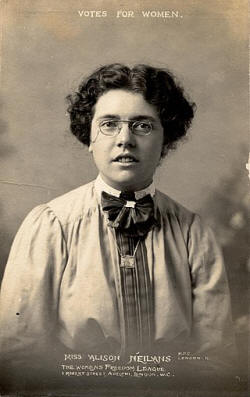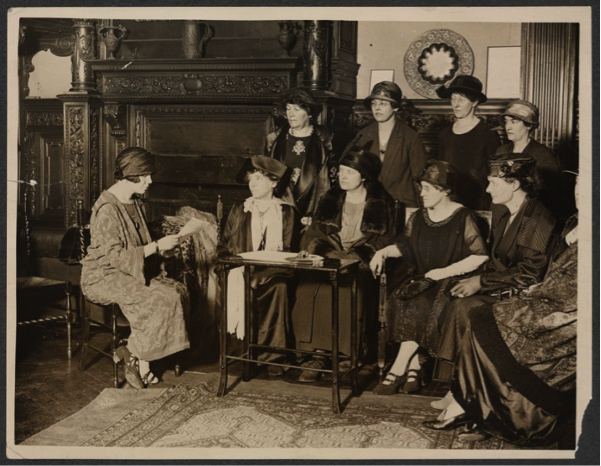

Partner Ethel (Madge) Turner
Queer Places:
Golders Green Crematorium
Golders Green, London Borough of Barnet, Greater London, England
 Alison
Roberta Noble Neilans (1884 – 17 July 1942) was an
English
suffragette. Neilans was a member of the executive committee of the
Women's Freedom League, a member of the
Church League for Women's Suffrage and the
East London Federation of Suffragettes, where she worked with
Sylvia Pankhurst. She was also a member of the board of the
International Woman Suffrage Alliance. Alison Neilans worked closely with
Hilda Matheson who was a lesbian and political secretary to MP
Nancy Astor. It is not clear whether
or not Alison Neilans was a lesbian, though if not homosexual she was most
certainly homosocial. Neilans lived with
Ethel (Madge) Turner for the last twelve years of her life and named
Turner the major beneficiary of her will.
Alison
Roberta Noble Neilans (1884 – 17 July 1942) was an
English
suffragette. Neilans was a member of the executive committee of the
Women's Freedom League, a member of the
Church League for Women's Suffrage and the
East London Federation of Suffragettes, where she worked with
Sylvia Pankhurst. She was also a member of the board of the
International Woman Suffrage Alliance. Alison Neilans worked closely with
Hilda Matheson who was a lesbian and political secretary to MP
Nancy Astor. It is not clear whether
or not Alison Neilans was a lesbian, though if not homosexual she was most
certainly homosocial. Neilans lived with
Ethel (Madge) Turner for the last twelve years of her life and named
Turner the major beneficiary of her will.
These women liaised with each other internationally through the League of Nations, the Women’s Freedom League, the British Commonwealth League and the Save the Children Fund. They also collaborated in expressing their political ideas through writing for journals such as Time and Tide edited by Margaret Haig, The Shield edited by Alison Neilans, the Woman’s Leader coedited by Elizabeth Macadam, and collaborated to write books such as Our Freedom and its Results by Five Women, edited by Ray Strachey and with contributions by Eleanor Rathbone, Ray Strachey, Erna Reiss, Alison Neilans and Mary Agnes Hamilton.
Neilans was born at East Dulwich, Surrey, on 19 June 1884, the only daughter of Robert and Alison Ferguson Noble Neilans of Coldstream-on-Tweed. She had a good life until her father died when she was twelve and she was obliged to work as a bookkeeper. She became the financial secretary of the Women's Freedom League in 1908.[1]
.jpg/1024px-Women's_Freedom_League_caravan_tour_(39633760521).jpg)
Charlotte Despard and Neilans at the caravan's window in 1908

Seated at the far left is Alice Paul conferring. Left to Right – Seated – Alice Paul, Elizabeth Robins, Viscountess Rhondda, Dr. Louisa Martindale, Mrs. Virginia Crawford, Dorothy Evans – Standing – Mrs. Pethick-Lawrence, Alison Neilans, Florence Underwood, Miss Barry.
Neilans was imprisoned three times for her activities; twice, for one month each occurrence, in 1908 and once, for three months, in 1909. Her third prison sentence was for pouring liquid into ballot boxes at a local by-election. She and Alice Chapin splashed chemicals over the ballot papers in the 1909 Bermondsey by-election.[2] Chapin was successful in damaging many ballot papers and Neilans damaged a few. All of the ballot papers were still readable and John Dumphreys was elected. However the presiding officer, George Thorley had chemicals splashed in his eye. At their trial the doctors said that Thorley may have a haze over his eyes for life.[3] The suffragettes believed that Thorley had exaggerated his injury and that damage that may have been done was due to him applying ammonia after the incident in an panicked attempt to alleviate damage.[4]
Chapin and Neilans were tried at the Old Bailey and Neilans later published an account of their defence.[5] Chapin was given a larger sentence than Neilans but she was released two days after her under the "King's Pardon".[4]
Eleanor Rathbone, Nina Boyle, Marian Reeves, Elsa Gye, Winifred Holtby, Alison Neilans, Edith Craig, Sylvia Pankhurst, and Emmeline Pethick-Lawrence were among the feminists who shared membership in the Myra Sadd Brown Memorial Library, which suggests that these women held similar intellectual, political and literary interests.
Mary Stocks, Eleanor Rathbone, Alison Neilans, Edith Picton-Turbervill and Maude Royden were, as representatives of the NUSEC, among the delegates at the tenth congress of the International Alliance of Women for Suffrage and Equal Citizenship (IAWSEC) in 1926. The Board of the Alliance at the time was presided over by Margery Corbett Ashby and included among the international complement of its board members, Bessie Rischbieth of Australia who was also on the Finance Committee. Rathbone was the ‘chairman’ of the international committee on “Family Endowment or Allowances.” Alison Neilans represented the Association for Moral and Social Hygiene. The international matrix at this congress comprised hundreds of women, many of whom were self-declared feminists and who represented national and international organisations. Dr. Muthulakshmi Reddi was among the Indian delegates.
On November 3 1938, a large group of Neilans' feminist friends and colleagues wrote a letter to the editor of The Times requesting donations for a presentation of a gift to Alison Nielans. Among the women signatories of the “wide circle of friends” who wished “to pay a public tribute to the magnificent work” Nielans had accomplished were Nina Boyle, Nancy Astor, Margery Corbett Ashby, Marjorie Nunburnholme, Eva Harterr, Vera Laughton Matthews, Maude Royden, Jane Walker and Helen Wilson. Nina Boyle, Dr. Maude Royden and Nancy Astor were among the speakers. Nancy Astor “proposed Miss Nielans’s health,” and demonstrated the quick wit she was known for in claiming that Nielans’ successful contribution to the raising of the age of consent bill “had changed the lives of thousands of men throughout the world”. The Times did not report the content of Nina Boyle’s and Maude Royden’s speeches but quoted the Archbishop of York’s admiration that Nielans “manfully stood for the fundamental unity of moral law and ideal for all persons, races and sexes”. Several lesbians and spinsters in the international feminist sorority were attributed with masculine characteristics in association with their work. Nina Boyle was considered “mannish.” Alison Neilans was seen as “manfully” carrying out her duties. Katharine Furse was remembered in obituaries, as much for her physical prowess as a champion skier, as for her role in international feminism.
Alison Roberta Noble Neilans died at the young age of fifty-eight on July 17 1942 after twenty-nine years as Secretary of the Association for Social and Moral Hygiene. Among the numerous mourners at her funeral, at Golders Green on July 21 1942, were her feminist friends and colleagues Rachel Crowdy, Nina Boyle, Nancy Astor, Grace Abbott (chairman of AMSH), Miss F. Barry of St. Joan’s International Alliance, Miss K. Courtney of the League of Nations Union, Daisy Solomon of the British Commonwealth League, Miss Anna Munro, Miss Marian Reeves of the Women’s Freedom League and many more from the international arms of organisations such as the Open Door Council and the International Council of Women. Bessie Rischbieth of the Australian Federation of Women Voters represented Australian women.
My published books: